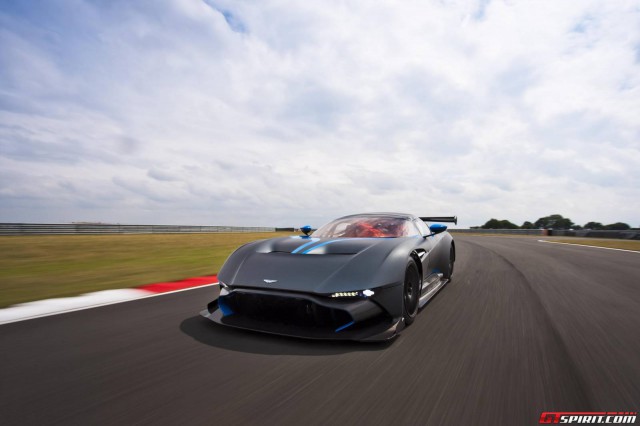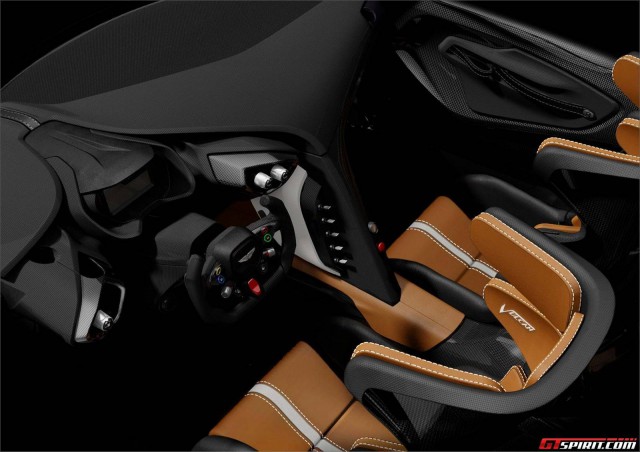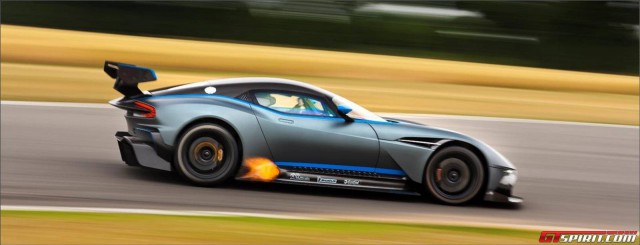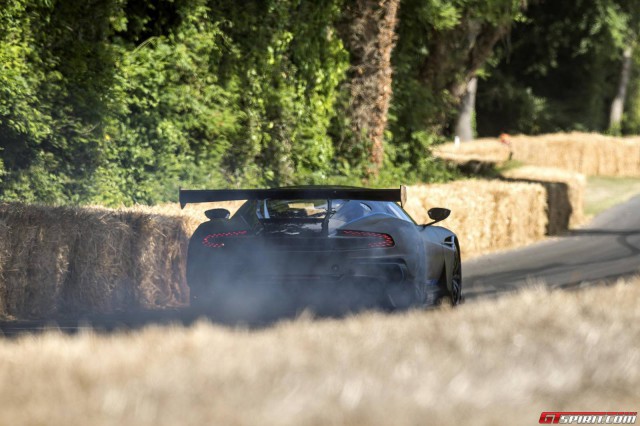
The Aston Martin Vulcan is the British-based carmaker’s track-legal
hypercar that will compete with the Ferrari FXX K and the McLaren P1
GTR. During GTspirit’s recent visit to the Nurburgring test center, we
had the opportunity to take a closer look at the Vulcan.
It showcases Aston Martin’s design and engineering capabilities and the Vulcan was
first unveiled at the Geneva Motor Show
in 2015. The production of the vehicle is limited to 24 units and all
of them aere sold, each carrying a price-tag of at least US$ 2.3
million.

The car has been designed by Aston Martin’s design chief Marek
Reichman, who took inspiration from the DB9 and Vantage to come up with
the blueprint for the Vulcan. It features a carbon-fiber chassis with
the raw tub weighing just 180 kg. It took nine men from Multimac and
four days to produce one carbon-fiber tub for the Vulcan. A carbon-fiber
chassis means that although the foundation of the car remains
lightweight, it is still very stiff and robust.
The engine of the Vulcan is derived from Aston Martin’s GT3 car and
has been built in conjuction with Aston Martin Racing. It is a
7.0-litre, naturally aspirated V12 motor that is capable of producing in
excess of 800 hp (600 kW). The engine of the Vulcan is located behind
the front axle. This improves the weight distribution and handling. The
engine will also sport a 3-position adjustable power output. This means
that the drivers will be able to unleash the true potential of the car
as and when their track skills reach the optimum level.
The exhaust system of the Vulcan is made from Inconel and titanium
for the maximum amount of weight reduction. Moreover, the torque tube is
30 per cent lighter owing to the use of magnesium for the outer casing.
Inside the torque tube is an uprated carbon-fibre propeller shaft that
helps to cope with the high torque output and to deliver the power to
the vehicle with minimal loss.

The engine is matted to a 6-speed sequential gearbox with
paddle-shifters and the power is transmitted to the rear wheels of the
car. The company claims that the gearbox has been tuned is such a manner
that at speeds exceeding 320 km/h, the Vulcan can accelerate faster
than Aston Martin’s GT3 cars. Not to forget, the gearbox only weighs 70
kg. In fact, the curb weight of the Vulcan is just 1350 kg, giving the
car a stunning power-to-weight ratio. The front and rear anti-roll bars
are adjustable, while the suspension of the Vulcan has been heavily
altered by Aston.
The car comes equipped with 10-spoke Satin Black wheels and 19-inch
Michelin tyres, which will be available in both slick and wet compounds
to the owners. Meanwhile, the braking system is acquired from Brembo.
The Vulcan has been fitted with a set of ceramic brake discs and
lightweight calipers from the Italian company. Aston Martin writes that
the aerodynamics have been set up to ensure “minimal change in
sensitivity and balance either forward or backward under braking or
accelerating.”

Moving on inside the Vulcan, there’s a FIA-compliant roll-cage and
carbon fibre bucket seats. The dashboard is supplied by Cosworth Omega
and features Cosworth aliveDRIVE system, which comes with a car camera
and USB download option. The owners will get a plethora of customisation
options on the Vulcan. Apart from the exterior and interior colour
options, they will be able to commission their own race suits and crash
helmets.
Some others features of the Vulcan include LED headlights, ‘Light
Blade’ taillamps first seen on the DP-100 Digital Concept Work and a
FIA-spec fire extinguisher in the cabin.
Following its moving debut at this year’s Goodwood Festival of Speed, the Vulcan will also be
presented at the
Monterey Car Week 2015 in California. Although previously there have been rumours of a road-legal Vulcan, its unlikely Aston Martin will build one.
The car is meant for the tracks and just like Ferrari’s XX program,
Aston Martin will provide the Vulcan owners the chance to take their
toys to the circuit, thanks to a three-year owners’ program. The first
track day will be held at the Paul Ricard circuit in France, while
events have also been planned for the Silverstone (UK), Spa (Belgium)
and Yas Marina (Abu Dhabi). Customers will also be offered a training
session on a race simulator at Darren Turner’s facility.























































